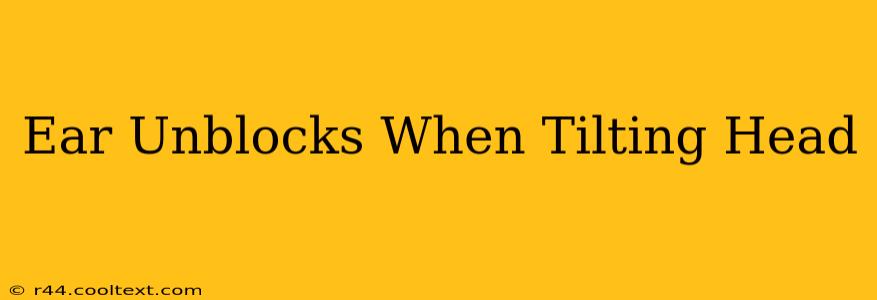Experiencing that satisfying pop when you tilt your head to relieve ear pressure? While often temporary and harmless, this symptom could indicate an issue with your Eustachian tubes. Understanding why this happens and when to seek professional help is crucial for maintaining healthy hearing.
What are Eustachian Tubes?
Your Eustachian tubes are narrow passages connecting your middle ear to the back of your throat. Their primary function is to equalize pressure between your middle ear and the outside environment. This pressure equalization is essential for proper hearing and prevents discomfort. When these tubes become blocked or malfunction, pressure imbalances occur, leading to various symptoms, including the need to tilt your head to unblock your ear.
Why Tilting Your Head Helps
Tilting your head can sometimes help unblock your Eustachian tubes by manipulating gravity. The change in position may help drain fluid or dislodge blockages, allowing air to flow more freely and equalize the pressure. This temporary relief is a common experience for many individuals, but it shouldn't be relied upon as a long-term solution.
Common Causes of Eustachian Tube Dysfunction
Several factors can contribute to Eustachian tube dysfunction, causing that frustrating feeling of a blocked ear and the need to constantly adjust your head position:
- Allergies: Swelling from allergies can inflame the lining of the Eustachian tubes, restricting airflow.
- Upper Respiratory Infections (URIs): Colds, the flu, and other respiratory infections can lead to inflammation and mucus buildup, obstructing the tubes.
- Changes in Altitude: Rapid changes in altitude, such as during air travel, can cause pressure imbalances requiring your body (and tilting your head) to adjust.
- Sinus Infections: Sinus infections can contribute to congestion and pressure changes affecting the Eustachian tubes.
- Barotrauma: This injury occurs due to pressure differences, often during scuba diving or air travel.
- Anatomical Abnormalities: In rare cases, structural abnormalities in the Eustachian tubes can cause persistent blockages.
When to See a Doctor
While tilting your head might provide temporary relief, persistent ear blockage, pain, or hearing loss requires professional medical attention. Don't hesitate to consult a doctor if you experience:
- Persistent ear pressure: If tilting your head doesn't provide relief, or the pressure returns quickly.
- Ear pain: Acute or persistent earache warrants immediate medical attention.
- Hearing loss: Any noticeable reduction in hearing ability should be evaluated by a medical professional.
- Discharge from the ear: Pus or other discharge suggests an infection and requires prompt treatment.
- Vertigo or dizziness: These symptoms could indicate a more serious underlying condition.
Managing Eustachian Tube Dysfunction
Your doctor can diagnose the underlying cause of your Eustachian tube dysfunction and recommend appropriate treatment. This may include:
- Decongestants: To reduce swelling and improve airflow.
- Nasal sprays: To help clear nasal passages.
- Antibiotics: If an infection is present.
- Ear tubes (tympanostomy tubes): In cases of persistent fluid buildup.
Remember: While tilting your head might temporarily relieve ear pressure, it’s not a cure. Addressing the underlying cause of Eustachian tube dysfunction is vital for long-term ear health and optimal hearing. Don't delay seeking medical attention if you have concerns about your ear health.

